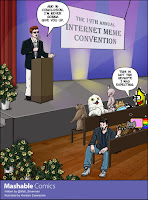What is a meme? A scientific term? Or 'a pretentious way of stating the obvious'?
 |
| This cartoon refers to 'Rickrolling' meme (see below) |
depended not on the particular chemical basis of genetics, but only on the existence of a self-replicating unit of transmission – in the case of biological evolution, the gene. For Dawkins, the meme exemplified another self-replicating unit with potential significance in explaining human behavior and cultural evolution.[1]The form a meme can take is very fluid. Here BBC Radio 4's Start the Week discuss a 'cultural meme'
listen to ‘English FAQ: What is a meme?’ on Audioboo
The term internet meme is a further simplification of what some have argued is a pseudo-scientific term. It is defined on one tech blog as:
The term internet meme is a further simplification of what some have argued is a pseudo-scientific term. It is defined on one tech blog as:
a catchphrase or concept that spreads quickly from person to person.The 'catchphrase' element refers to the fads that sweep the Internet, achieving extraordinary levels of participation before fading away. The classic example of this was Rickrolling in 2007.
Ideas, beliefs or 'concepts' can similarly gain rapid mass acceptance, regardless of their basis in fact. They they often represent an 'agreed wisdom' - X football manager is unhappy at his current club, Apple are releasing a new tablet and so on.
Political bloggers often use meme as a shorthand for topic. For example: President Obama will move to the political centre until the next presidential election. Typically a meme of this sort represents the agreed consensus on on a topic - though this does not necessarily mean that it has basis in fact.
Not everyone is convinced that meme should be the go-to word for every context. Philosopher Mary Midgley speaks for many when she suggests that it a ' a pretentious way of stating the obvious' while Matt Labash has a lot of fun satirising The Meme Generation - one of NYT columnist David Brooks' favourite articles of 2012.
Darwinian Fairytales: Selfish Genes and Other Fables of Evolution
The Language of Baseball: A Complete Dictionary of The Grand Ole Game